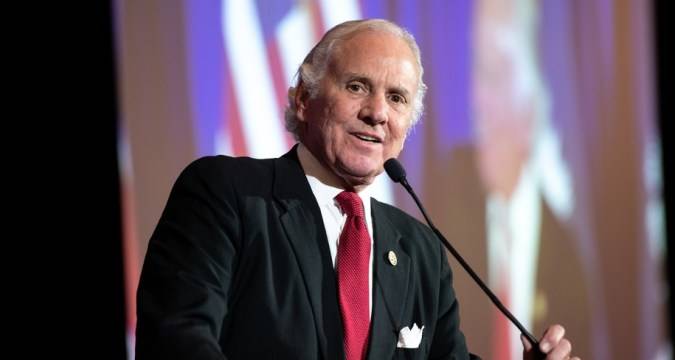South Carolina Governor Calls For LGBTQ+ Book To Be Banned In Schools
South Carolina Governor Henry McMaster urged his state's Department of Education this week to remove a book about gender identity from school shelves, calling it “obscene and pornographic,” and to “investigate” similar content.

The award-winning book in question, Gender Queer: A Memoir, chronicles non-binary author Maia Kobabe's journey of self-identity but is being challenged for its graphic illustrations of LGBTQ+ sexual experiences.
McMaster, a Republican, sent a letter to Department of Education Superintendent of Education Molly Spearman on Wednesday, asking her to investigate how the illustrated book ended up at a public high school in Fort Mill, South Carolina, and to “prevent” similar books from becoming available in the state's school libraries.
“We’re going to remove things that cause harm to our children or put obstacles in their path as they grow up,” McMaster told reporters Thursday.
According to NBC News, the governor's request marks the latest instance of government and school officials around the country – including in Texas, Virginia, Ohio and New Jersey – aiming to rid books from school libraries that contain LGBTQ+ and race-related content.
Every year, the American Library Association compiles a list of the country’s “most challenged books,” which contains books that were heavily requested to be banned from libraries and schools, “to inform the public about censorship,” according to the association’s website.
The director of the ALA Office for Intellectual Freedom, Deborah Caldwell-Stone, told NBC News that while reported challenges against books with LGBTQ+ content have historically been “constant,” this year, the association has seen a “chilling” uptick.
“I've worked at ALA for two decades now, and I've never seen this volume of challenges come in,” Caldwell-Stone said. “The impact will fall to those students who desperately want and need books that reflect their lives, that answer questions about their identity, about their experiences that they always desperately need and often feel that they can't talk to adults about.”
“The library becomes that safe space where they can get accurate information about these topics that they can't otherwise find,” she added.
Last year, Gender Queer: A Memoir was one of 10 recipients of the ALA Alex Award, which was “created to recognize that many teens enjoy and often prefer books written for adults,” according to the ALA’s website.
Published in 2019, it has recently drawn the ire of school officials in several states throughout the country.
Virginia’s largest school district, Fairfax County Public Schools, banned the book in September. Brevard Public Schools, a school district in Florida, removed the book last month. And a group of parents in New Jersey, a state of largely Democratic voters, is challenging the book and several others, calling them “perverse.”
The book even came up as a talking point in the recent and contentious Virginia governor's race, where the Republican candidate, former private equity executive and political newcomer Glenn Youngkin, made education a central issue of his campaign and swept to victory.
Kobabe responded last month, writing an a op-ed in The Washington Post that “removing or restricting queer books in libraries and schools is like cutting a lifeline for queer youth, who might not yet even know what terms to ask Google to find out more about their own identities, bodies and health.”
The chief communications officer for the South Carolina Department of Education, Ryan Brown, told NBC News on Friday that the department had learned about the book in Fort Mill's public schools last week and contacted the district's superintendent, who had already instructed staff to remove the book “immediately.”
“It is clear that in this particular instance, the district failed to properly vet the book in question for adoption,” Brown said in an email, defending the book's removal. “We had already begun a review of district policies concerning locally purchased texts after this incident occurred and will make recommendations for improvement.”
LGBTQ+ advocates condemned McMaster's request to ban the book, calling it a “political attack.”
“We need to be focused on issues that are actually impacting students right now – getting education back on track after the loss of learning from the pandemic, addressing young people’s health concerns, and ensuring that everyone feels safe and welcome in school,” Ivy Hill, community health program director for the Campaign for Southern Equality, said in a statement.
Caldwell-Stone added that the recent developments were “stunning” to see in a democracy like the United States.
“We have this wonderful liberty in this United States to think for ourselves, to make decisions for ourselves, to choose what we want to read, to say what we want to say, decide for ourselves what we believe,” she said. “And these proposals to scrub school libraries and public libraries of these books are nothing more than a deeply antidemocratic denial of that right and ultimately, if carried out, will be destructive of our democracy.”
Read related myGwork articles here:
Librarians In Wyoming Face Criminal “Obscenity” Charges For Stocking LGBTQ+ Books In Teen Sections
Hungary Restricts Sales Of LGBTQ+-Themed Children's Books
Proud Gay Dads Publish Adorable Kids’ Picture Book About A Girl With Two Fathers
Keep up to date with the latest myGnews
Sign up to mygwork
________
LGBTQ+ professionals, LGBTQ+ Graduates, LGBTQ+ professional network, LGBTQ+ professional events, LGBTQ+ networking events, LGBTQ+ Recruitment, LGBTQ+ Friendly organizations, LGBTQ+ Friendly companies, LGBTQ+ jobs

